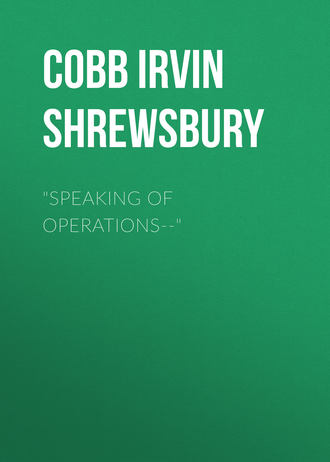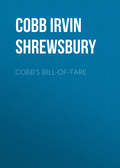
Cobb Irvin Shrewsbury
"Speaking of Operations--"
The orderly and the nurse trundled me out into the hall and loaded me into an elevator, which was to carry us up to the top of the hospital. Several other nurses were already in the elevator. As we came aboard one of them remarked that it was a fine day. A fine day for what? She did not finish the sentence.
Everybody wore a serious look. Inside of myself I felt pretty serious too—serious enough for ten or twelve. I had meant to fling off several very bright, spontaneous quips on the way to the table. I thought them out in advance, but now, somehow, none of them seemed appropriate. Instinctively, as it were, I felt that humor was out of place here.
I never knew an elevator to progress from the third floor of a building to the ninth with such celerity as this one on which we were traveling progressed. Personally I was in no mood for haste. If there was anyone else in all that great hospital who was in a particular hurry to be operated on I was perfectly willing to wait. But alas, no! The mechanism of the elevator was in perfect order—entirely too perfect. No accident of any character whatsoever befell us en route, no dropping back into the basement with a low, grateful thud; no hitch; no delay of any kind. We were certainly out of luck that trip. The demon of a joyrider who operated the accursed device jerked a lever and up we soared at a distressingly high rate of speed. If I could have had my way about that youth he would have been arrested for speeding.
Now we were there! They rolled into a large room, all white, with a rounded ceiling like the inside of an egg. Right away I knew what the feelings of a poor, lonely little yolk are when the spoon begins to chip the shell. If I had not been so busy feeling sorry for myself I think I might have developed quite an active sympathy for yolks.
My impression had been that this was to be in the nature of a private affair, without invitations. I was astonished to note that quite a crowd had assembled for the opening exercises. From his attire and general deportment I judged that Doctor Z was going to be the master of the revels, he being attired appropriately in a white domino, with rubber gloves and a fancy cap of crash toweling. There were present, also, my diagnostic friend, Doctor X, likewise in fancy-dress costume, and a surgeon I had never met. From what I could gather he was going over the course behind Doctor Z to replace the divots.
And there was an interne in the background, playing caddy, as it were, and a head nurse, who was going to keep the score, and two other nurses, who were going to help her keep it. I only hoped that they would show no partiality, but be as fair to me as they were to Doctor Z, and that he would go round in par.
So they placed me right where my eyes might rest on a large wall cabinet full of very shiny-looking tools; and they took my cigar away from me and folded my hands on the wide bowknot of my sash. Then they put a cloth dingus over my face and a voice of authority told me to breathe. That advice, however, was superfluous and might just as well have been omitted, for such was my purpose anyhow. Ever since I can recall anything at all, breathing has been a regular habit with me. So I breathed. And, at that, a bottle of highly charged sarsaparilla exploded somewhere in the immediate vicinity and most of its contents went up my nose.
I started to tell them that somebody had been fooling with their ether and adulterating it, and that if they thought they could send me off to sleep with soda pop they were making the mistake of their lives, because it just naturally could not be done; but for some reason or other I decided to put off speaking about the matter for a few minutes. I breathed again—again—agai——
I was going away from there. I was in a large gas balloon, soaring up into the clouds. How pleasant!... No, by Jove! I was not in a balloon—I myself was the balloon, which was not quite so pleasant. Besides, Doctor Z was going along as a passenger; and as we traveled up and up he kept jabbing me in the midriff with the ferrule of a large umbrella which he had brought along with him in case of rain. He jabbed me harder and harder. I remonstrated with him. I told him I was a bit tender in that locality and the ferrule of his umbrella was sharp. He would not listen. He kept on jabbing me.
Something broke! We started back down to earth. We fell faster and faster. We fell nine miles, and after that I began to get used to it. Then I saw the earth beneath and it was rising up to meet us.
A town was below—a town that grew larger and larger as we neared it. I could make out the bonded indebtedness, and the Carnegie Library, and the moving-picture palaces, and the new dancing parlor, and other principal points of interest.
At the rate we were falling we were certainly going to make an awful splatter in that town when we hit. I was sorry for the street-cleaning department.
We fell another half mile or so. A spire was sticking up into the sky directly beneath us, like a spear, to impale us. By a supreme effort I twisted out of the way of that spire, only to strike squarely on top of the roof of a greenhouse back of the parsonage, next door. We crashed through it with a perfectly terrific clatter of breaking glass and landed in a bed of white flowers, all soft and downy, like feathers.
And then Doctor Z stood up and combed the debris out of his whiskers and remarked that, taking it by and large, it had been one of the pleasantest little outings he had enjoyed in the entire course of his practice. He said that as a patient I was fair, but as a balloon I was immense. He asked me whether I had seen anything of his umbrella and began looking round for it. I tried to help him look, but I was too tired to exert myself much. I told him I believed I would take a little nap.
I opened a dizzy eye part way. So this was heaven—this white expanse that swung and swam before my languid gaze? No, it could not be—it did not smell like heaven. It smelled like a hospital. It was a hospital. It was my hospital. My nurse was bending over me and I caught a faint whiff of the starch in the front of her crisp blue blouse. She was two-headed for the moment, but that was a mere detail. She settled a pillow under my head and told me to lie quiet.
I meant to lie quiet; I did not have to be told. I wanted to lie quiet and hurt. I was hurty from head to toe and back again, and crosswise and cater-cornered. I hurt diagonally and lengthwise and on the bias. I had a taste in my mouth like a bird-and-animal store. And empty! It seemed to me those doctors had not left anything inside of me except the acoustics. Well, there was a mite of consolation there. If the overhauling had been as thorough as I had reason to believe it was from my present sensations, I need never fear catching anything again so long as I lived, except possibly dandruff.
I waved the nurse away. I craved solitude. I desired only to lie there in that bed and hurt—which I did.
I had said beforehand I meant to stay in St. Germicide's for two or three days only. It is when I look back on that resolution I emit the hollow laugh elsewhere referred to. For exactly four weeks I was flat on my back. I know now how excessively wearied a man can get of his own back, how tired of it, how bored with it! And after that another two weeks elapsed before my legs became the same dependable pair of legs I had known in the past.
I did not want to eat at first, and when I did begin to want to they would not let me. If I felt sort of peckish they let me suck a little glass thermometer, but there is not much nourishment really in thermometers. And for entertainment, to wile the dragging hours away, I could count the cracks in the ceiling and read my temperature chart, which was a good deal like Red Ames' batting average for the past season—ranging from ninety-nine to one hundred and four.
Also, through daily conversations with my nurse and with the surgeons who dropped in from time to time to have a look at me, I learned, as I lay there, a great deal about the medical profession—that is, a great deal for a layman—and what I learned filled me with an abiding admiration for it, both as a science and as a business. This surely is one profession which ever keeps its face to the front. Burying its past mistakes and forgetting them as speedily as possible, it pushes straight forward into fresh fields and fresh patients, always hopeful of what the future may bring in the way of newly discovered and highly expensive ailments. As we look backward upon the centuries we are astonished by its advancement. I did a good deal of looking backwards upon the centuries during my sojourn at St. Germicide's.
Take the Middle Ages now—the period when a barber and a surgeon were one and the same. If a man made a failure as a barber he turned his talents to surgery. Surgeons in those times were a husky breed. I judge they worked by the day instead of by piecework; anyhow the records show they were very fond of experiments where somebody else furnished the raw material.
When there came a resounding knock at the tradesman's entrance of the moated grange, the lord of the manor, looking over the portcullis and seeing a lusty wight standing down below, in a leather apron, with his sleeves rolled up and a kit of soldering tools under his arm, didn't know until he made inquiry whether the gentle stranger had come to mend the drain or remove the cook's leg.
A little later along, when gunpowder had come into general use as a humanizing factor of civilization, surgeons treated a gunshot wound by pouring boiling lard into it, which I would say was calculated to take the victim's mind off his wound and give him something else to think about—for the time being, anyhow. I assume the notion of applying a mustard plaster outside one's stomach when one has a pain inside one's stomach is based on the same principle.







